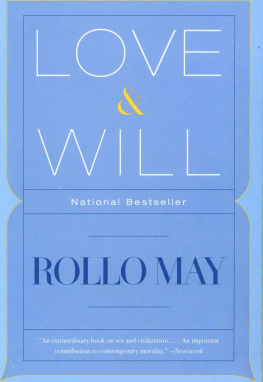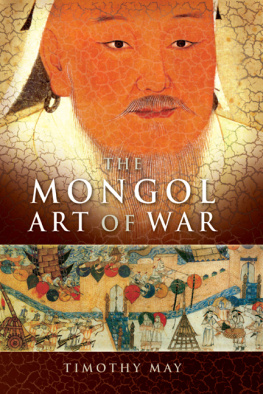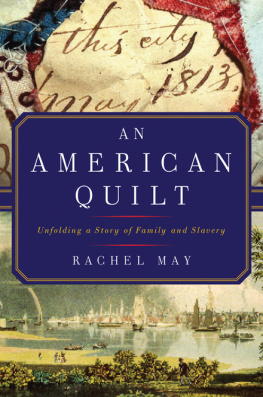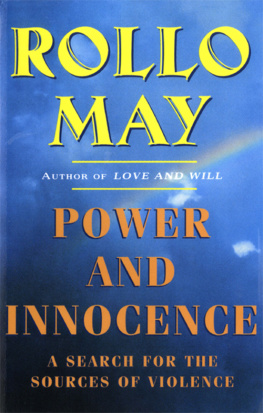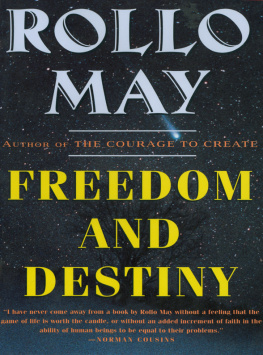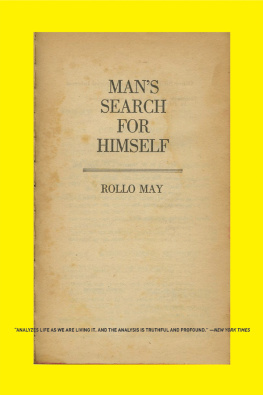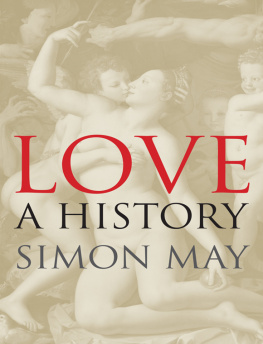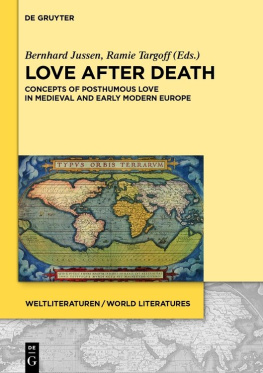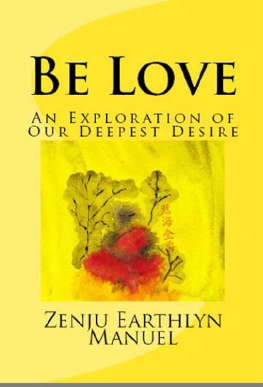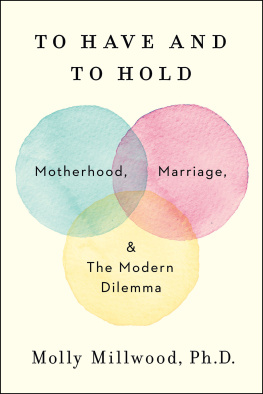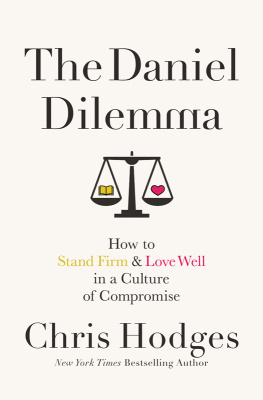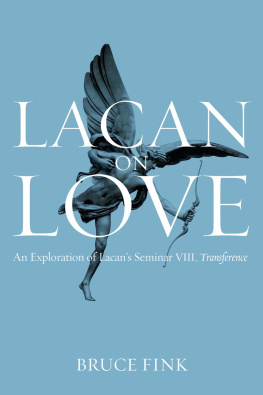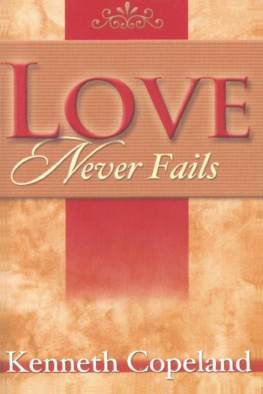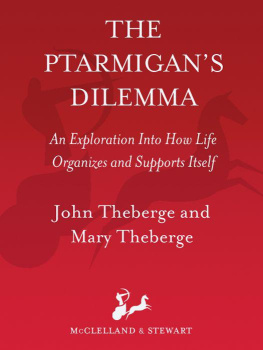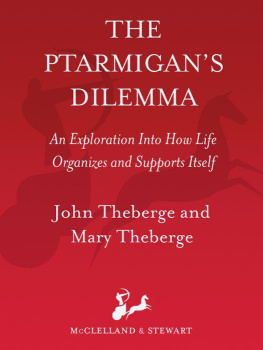May - Love and will
Here you can read online May - Love and will full text of the book (entire story) in english for free. Download pdf and epub, get meaning, cover and reviews about this ebook. City: New York, year: 2007;1969, publisher: W. W. Norton & Company, genre: Romance novel. Description of the work, (preface) as well as reviews are available. Best literature library LitArk.com created for fans of good reading and offers a wide selection of genres:
Romance novel
Science fiction
Adventure
Detective
Science
History
Home and family
Prose
Art
Politics
Computer
Non-fiction
Religion
Business
Children
Humor
Choose a favorite category and find really read worthwhile books. Enjoy immersion in the world of imagination, feel the emotions of the characters or learn something new for yourself, make an fascinating discovery.
- Book:Love and will
- Author:
- Publisher:W. W. Norton & Company
- Genre:
- Year:2007;1969
- City:New York
- Rating:5 / 5
- Favourites:Add to favourites
- Your mark:
- 100
- 1
- 2
- 3
- 4
- 5
Love and will: summary, description and annotation
We offer to read an annotation, description, summary or preface (depends on what the author of the book "Love and will" wrote himself). If you haven't found the necessary information about the book — write in the comments, we will try to find it.
May: author's other books
Who wrote Love and will? Find out the surname, the name of the author of the book and a list of all author's works by series.
Love and will — read online for free the complete book (whole text) full work
Below is the text of the book, divided by pages. System saving the place of the last page read, allows you to conveniently read the book "Love and will" online for free, without having to search again every time where you left off. Put a bookmark, and you can go to the page where you finished reading at any time.
Font size:
Interval:
Bookmark:
By the same author
MANS SEARCH FOR HIMSELF
THE MEANING OF ANXIETY
THE ART OF COUNSELING
PSYCHOLOGY AND THE HUMAN DILEMMA
SPRINGS OF CREATIVE LIVING
DREAMS AND SYMBOLS ( WITH LEOPOLD CALIGOR )
EXISTENCE: A NEW DIMENSION IN
PSYCHIATRY AND PSYCHOLOGY
( WITH ANGEL AND ELLENBERGER )
EXISTENTIAL PSYCHOLOGY ( ED .)
SYMBOLISM IN RELIGION AND
LITERATURE ( ED .)

W. W. NORTON & COMPANY
New York London
Copyright 1969 by W. W. Norton & Company, Inc.
All rights reserved
First published as a Norton paperback 2007
For information about permission to reproduce selections from this book, write to Permissions, W. W. Norton & Company, Inc., 500 Fifth Avenue, New York, NY 10110
Manufacturing by RRD, Bloomsburg
Production manager: Devon Zahn
Library of Congress Catalog Card No. 66-12799
ISBN: 978-0-393-33005-2
W. W. Norton & Company, Inc.
500 Fifth Avenue, New York, N.Y. 10110
www.wwnorton.com
W. W. Norton & Company Ltd.
Castle House, 75/76 Wells Street, London WIT 3QT
Some readers will wonder at the juxtaposition of love and will in the title of this book. I have long believed that love and will are interdependent and belong together. Both are conjunctive processes of beinga reaching out to influence others, molding, forming, creating the consciousness of the other. But this is only possible, in an inner sense, if one opens oneself at the same time to the influence of the other. And will without love becomes manipulationof which the age just preceding the First World War is replete with examples. Love without will in our own day becomes sentimental and experimental.
I take the authors usual pride, as well as responsibility, for the ideas in this book. But in the eight years it was in process of being written a number of friends read and discussed chapters with me. I want to thank them: Jerome Bruner, Doris Cole, Robert Lifton, Gardner Murphy, Elinor Roberts, Ernest Schachtel, and the late Paul Tillich. Jessica Ryan has given the intuitive understanding combined with practical suggestions that an author always feels he requires more than gratitude.
During the long summers in New Hampshire when this book was being written I would often get up early in the morning and go out on my patio where the valley, stretching off to the mountain ranges in the north and east, was silver with predawn mist. The birds, eloquent voices in an otherwise silent world, had already begun their hallelujah chorus to welcome in the new day. The song sparrow sings with an enthusiasm which rocks him almost off his perch atop the apple tree, and the goldfinch chimes in with his obligato. The thrush in the woods is so full of song he cant contain himself. The woodpecker beats on the hollow beech tree. The loons over on the lake erupt with their plaintive and tormented daemonic, to save the whole thing from being too sweet. Then the sun comes up over the mountain range revealing an incredibly green New Hampshire overflowing through the whole long valley with a richness that is almost too abundant. The trees seem to have grown several inches overnight, and the meadow is bursting with a million brown-eyed Susans.
I feel again the everlasting going and coming, the eternal return, the growing and mating and dying and growing again. And I know that human beings are part of this eternal going and returning, part of its sadness as well as its song. But man, the seeker, is called by his consciousness to transcend the eternal return. I am no different from anyone elseexcept in the choice of areas for the quest. My own conviction has always been to seek the inner reality, with the belief that the fruits of future values will be able to grow only after they are sown by the values of our history. In this transitional twentieth century, when the full results of our bankruptcy of inner values is brought home to us, I believe it is especially important that we seek the source of love and will.
Rollo May
Holderness,
New Hampshire, 1969
Cassandra: Apollo was the seer who set me this work.
Chorus: Were you already ecstatic in the skills of God?
Cassandra: Yes; even then I read my citys destinies.
from Agamemnon , by Aeschylus
The striking thing about love and will in our day is that, whereas in the past they were always held up to us as the answer to lifes predicaments, they have now themselves become the problem . It is always true that love and will become more difficult in a transitional age; and ours is an era of radical transition. The old myths and symbols by which we oriented ourselves are gone, anxiety is rampant; we cling to each other and try to persuade ourselves that what we feel is love; we do not will because we are afraid that if we choose one thing or one person well lose the other, and we are too insecure to take that chance. The bottom then drops out of the conjunctive emotions and processesof which love and will are the two foremost examples. The individual is forced to turn inward; he becomes obsessed with the new form of the problem of identity, namely, Even-if-I-know-who-I-am, I-have-no-significance. I am unable to influence others. The next step is apathy. And the step following that is violence. For no human being can stand the perpetually numbing experience of his own powerlessness.
So great was the emphasis on love as the resolution to lifes predicament that peoples self-esteem ascended or fell depending on whether or not they had achieved it. Those who believed they had found it indulged in self-righteousness, confident in their visible proof of salvation as the Calvinists wealth used to be tangible evidence of his being numbered among the elect. Those who failed to find it felt not simply bereft to a greater or lesser extent, but, on a deeper and more damaging inner level, their self-esteem was undermined. They felt marked as a new species of pariah, and would confess in psychotherapy that they awoke in the small hours of the morning not necessarily especially lonely or unhappy but plagued with the gnawing conviction that they had somehow missed the great secret of life. And all the while, with rising divorce rates, the increasing banalization of love in literature and art, and the fact that sex for many people has become more meaningless as it is more available, this love has seemed tremendously elusive if not an outright illusion. Some members of the new political left came to the conclusion that love is destroyed by the very nature of our bourgeois society, and the reforms they proposed had the specific purpose of making a world in which love is more possible.
In such a contradictory situation, the sexual form of lovelowest common denominator on the ladder of salvationunderstandably became our preoccupation; for sex, as rooted in mans inescapable biology, seems always dependable to give at least a facsimile of love. But sex, too, has become Western mans test and burden more than his salvation. The books which roll off the presses on technique in love and sex, while still best-sellers for a few weeks, have a hollow ring: for most people seem to be aware on some scarcely articulated level that the frantic quality with which we pursue technique as our way to salvation is in direct proportion to the degree to which we have lost sight of the salvation we are seeking. It is an old and ironic habit of human beings to run faster when we have lost our way; and we grasp more fiercely at research, statistics, and technical aids in sex when we have lost the values and meaning of love. Whatever merits or failings the Kinsey studies and the Masters-Johnson research have in their own right, they are symptomatic of a culture in which the personal meaning of love has been progressively lost. Love had been assumed to be a motivating force, a power which could be relied upon to push us onward in life. But the great shift in our day indicates that the motivating force itself is now called into question. Love has become a problem to itself.
Font size:
Interval:
Bookmark:
Similar books «Love and will»
Look at similar books to Love and will. We have selected literature similar in name and meaning in the hope of providing readers with more options to find new, interesting, not yet read works.
Discussion, reviews of the book Love and will and just readers' own opinions. Leave your comments, write what you think about the work, its meaning or the main characters. Specify what exactly you liked and what you didn't like, and why you think so.

